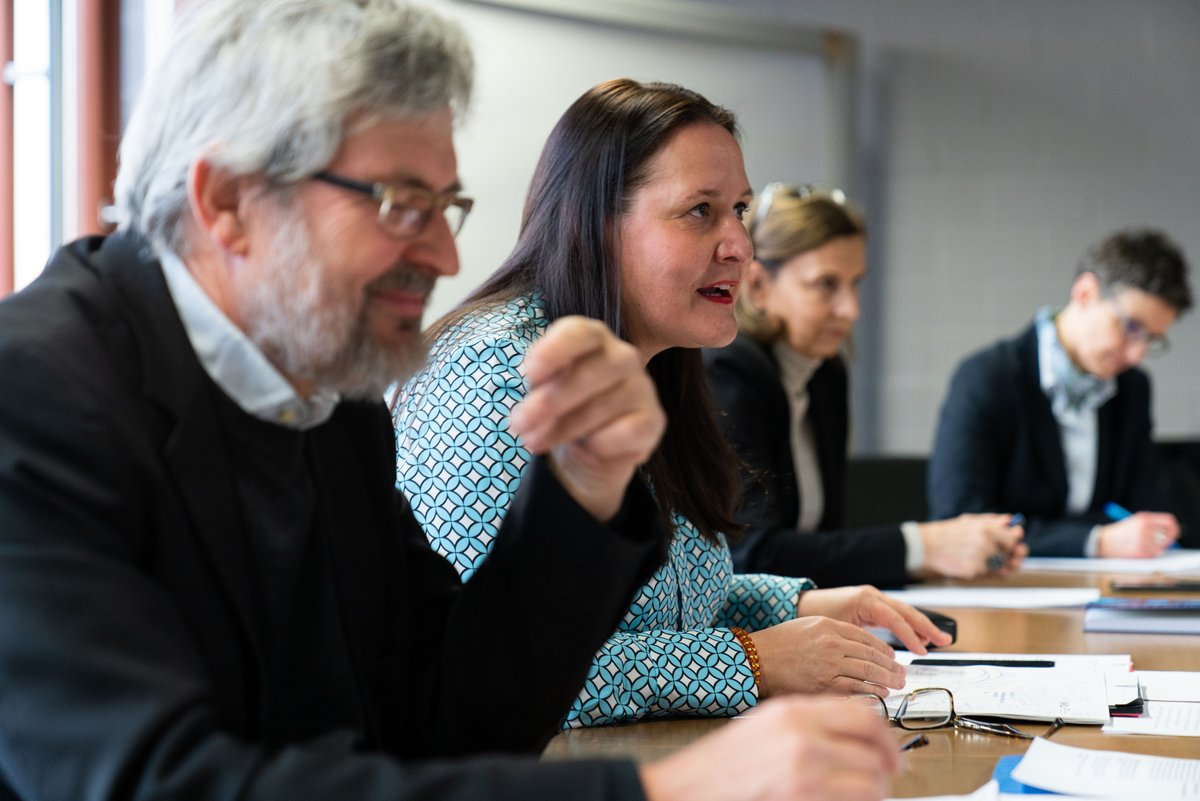BTU sets the pace in the Lausitz region of structural change
Science Minister Dr. Manja Schüle and Environment Minister Axel Vogel visited the Institute of Environmental Sciences and Technology of the Brandenburg University of Technology Cottbus-Senftenberg (BTU) today on the sidelines of the cabinet on-site meeting in Cottbus/Chóśebuz. During the visit, among other things, the alliance 'Land-Innovation-Lausitz' (LIL) was presented. Scientists from the BTU and the Leibniz Center for Agricultural Landscape Research (ZALF) are conducting joint research as part of the LIL project on strategies to strengthen sustainable agriculture in Lusatia, which is affected by structural and climate change. This was followed by a round of talks with students from various courses of study at the institute.
Science Minister Dr. Manja Schüle: "What happens when the research strength of the Brandenburg University of Technology Cottbus-Senftenberg meets the bioeconomy expertise of the Leibniz Center for Agricultural Landscape Research? Clearly: A further success story 'Made in Brandenburg'. For example, in the 'Land-Innovation-Lausitz' alliance of the Institute of Environmental Sciences and Technology: Here, research is being conducted on the agriculture of the future, central issues of food security and sustainable cycles in the agricultural economy. The goal: to establish Lusatia as a model region for a sustainable and climate-resilient bioeconomy. This makes it clear once again: science and research are the pacemakers of successful structural change - and it is in and with Lusatia that the central questions for the future will be answered and solutions for global challenges will be developed."
Environment Minister Axel Vogel: "Brandenburg has an outstanding research landscape. Both in the agricultural and in the environmental and climate protection sector, scientists in research institutions are dealing with the major questions and the effects of climate change. The BTU Cottbus-Senftenberg, as a technical university with a practical orientation, is an important driving force for the necessary and pending transformation in the state of Brandenburg. Many experienced experts already come from here, who are needed to successfully shape the energy, mobility and agricultural transformation. The state can also benefit from this huge potential as an attractive employer."
BTU President Prof. Dr. Gesine Grande: "With the founding of the Institute for Environmental Sciences and Technology in 2022, twelve BTU professorships have pooled their expertise to research solutions for complex environmental problems in Cottbus and Bad Saarow. The institute is an excellent example of how interdisciplinary approaches are needed to successfully analyze and address scientific challenges such as water ecology, land use and biodiversity, and the understanding and management of post-mining landscapes. The faculty strengthens the BTU profile line Global Change and Transformation Processes. For students, courses such as Land Use and Water Management, Environmental Engineering, Environmental and Resource Management, or Euro Hydroinformatics and Water Management offer excellent opportunities to participate scientifically in the solution of environmental problems already during their studies."
The Institute of Environmental Science and Engineering at BTU Cottbus-Senftenberg, together with the Institutes of Materials Chemistry and Biotechnology, is part of the Faculty of Environment and Natural Sciences and is guided by principles of sustainability and health. With the founding of the institute, scientists from twelve disciplines have pooled their expertise in research and transfer in order to research solutions to complex challenges that require an integrative view of environmental systems. Teaching at the Institute is based on three pillars: The natural science pillar includes, in particular, biogeoscientific knowledge and skills for understanding and managing natural and anthropogenically influenced landscapes. Engineering skills are taught to develop and implement technical solutions to environmental problems. Social science and planning know-how enables them to comprehend and manage environmental systems holistically. The institute currently has 47 employees and 891 students.
As part of the 'Kabinett vor Ort' (cabinet on site) format, the state government is making stops in all 18 districts and independent cities to talk to district administrators and mayors about current issues and joint projects.
Contact
Ilka Seer
Press speaker
T +49 (0) 355 69 3612
ilka.seer(at)b-tu.de

